Coaching helps clients develop skills and mindsets to solve their own problems, while consulting delivers expert solutions and implementations. Choose coaching if you want to guide people’s growth, and consulting if you prefer solving problems with your specialized knowledge.
–
For the 5 questions that reveal which career path suits you, jump to this section.
–
At-A-Glance Differences: Coaching vs Consulting
Aspect | Coaching Career | Consulting Career |
|---|---|---|
Your Primary Role | Facilitate client skill development | Solve problems with expertise |
Typical Engagement | Ongoing relationships (weeks – months) | Project-based work |
What You Deliver | Questions, frameworks, accountability | Solutions, reports, implementations |
Income Potential | $150–$500/hr | $150–$600/hr |
Best For | People who love developing others | Experts who enjoy problem-solving |
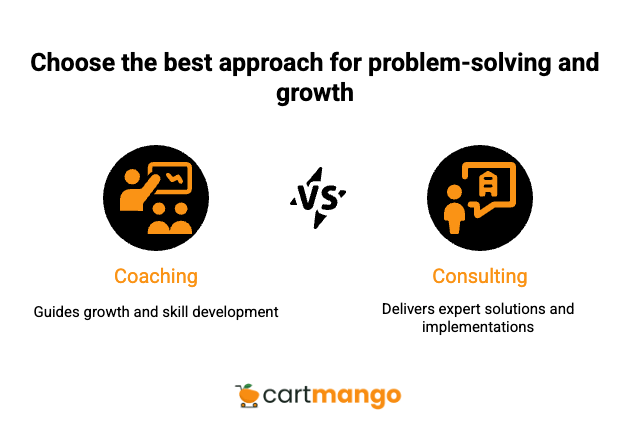
The coaching industry experienced a 17% compound annual growth rate (CAGR) from 2019 – 2023 (Source: International Coaching Federation
The consulting industry is around $1.06 trillion in 2025 and expected to grow to $1.32 trillion by 2029 (Source: Research And Markets).
The market is hungry for both types of professionals. The question is: which one matches your natural strengths and career goals?
What Your Life Looks Like as a Coach
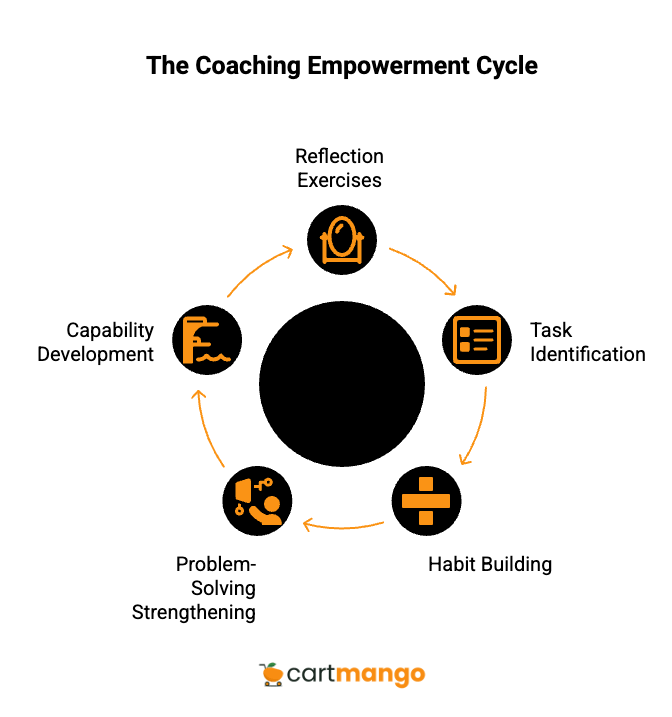
Consider Sarah who transitioned from corporate HR to executive coaching three years ago. Her days revolve around deep conversations, behavioral observations, and accountability partnerships.
Sarah starts each session with structured questions designed to help clients discover their own insights. She’s not giving answers. She’s guiding people to find solutions that fit their unique situations and leadership styles.
The process requires patience and emotional intelligence. You’ll spend sessions asking uncomfortable questions that make clients examine their assumptions. You’ll hold people accountable when they want to make excuses or avoid difficult changes.
Here’s what surprised Sarah most: coaching success depends on your ability to listen, not talk. She spends more time processing what clients aren’t saying than responding to what they are saying.
A typical coaching relationship might involve helping an entrepreneur learn to delegate effectively. You’d guide them through reflection exercises, help them identify which tasks only they can handle, and support them as they build new management habits.
The International Coaching Federation (ICF) core competencies define this work as partnership-focused rather than expert-driven. You’re not the smartest person in the room. You’re the person who helps others access their own wisdom.
Coaches create lasting change by strengthening their clients’ problem-solving muscles. You teach people to fish rather than catching fish for them. The satisfaction comes from watching someone develop capabilities they’ll use for years.
The emotional rewards are incredible, but the income takes time to build. Most new coaches struggle financially during their first 1-2 years while building their client base and refining their skills.
What Your Life Looks Like as a Consultant
Consultants operate in a completely different world. Your value comes from specialized expertise and your ability to implement proven solutions quickly.
I’ve watched several consultant friends work through complex business problems. They show up, assess the situation, and deliver expert recommendations based on their deep knowledge in specific areas.
Take Marcus who specializes in sales-conversion optimization. When he works with a software company, he spends the first week analyzing funnel data, user behavior patterns, and conversion bottlenecks.
Then comes implementation mode. Marcus redesigns landing pages, creates new email sequences, and sets up A/B testing frameworks. His clients get measurable results within weeks because he’s applying battle-tested strategies to their specific situations.
This is why businesses pay premium rates for this expertise. Consultants deliver quick value by solving problems clients can’t handle internally.
Your day-to-day involves diagnostic work, strategic planning, and hands-on implementation. You’re the expert who has seen these problems before and knows exactly how to fix them.
Consulting can be more lucrative faster than coaching because you’re selling proven solutions rather than developing relationships. But it requires deep expertise in specific domains and the ability to work under pressure with tight deadlines.
The challenge? You need to constantly stay ahead of industry trends and maintain your reputation as the go-to expert in your niche.
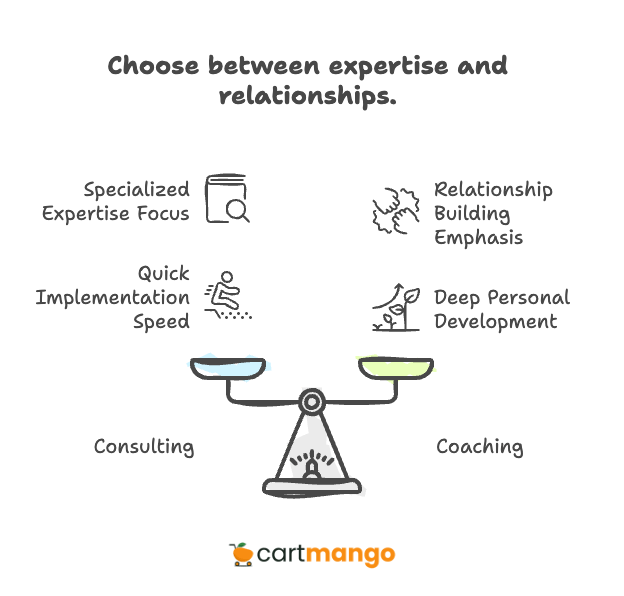
The Money Reality: What You Can Actually Earn
Scenario | Coaching Business | Consulting Business |
|---|---|---|
Typical Package | $5,000 for 3-month leadership program | $25,000 for 4-6 week strategic project |
Client Acquisition | Slower relationship-building process | Faster based on expertise reputation |
Income Predictability | Recurring revenue from ongoing clients | Project-based with potential gaps |
Scaling Potential | Group programs, courses, speaking | Higher rates, team building, retainers |
Source: ICF study.
Coaching income grows slowly but steadily. You build relationships that can last years, creating predictable recurring revenue.
Consulting can generate higher income faster if you have valuable expertise. Specialized consultants often charge $300-$600+ per hour or $10,000-$50,000+ per project. But income can be more volatile between projects.
Both paths can lead to six-figure incomes, but through different business models and timelines.
The 5 Questions That Reveal Your Best Path
Question | Points to Coaching When… | Points to Consulting When… |
|---|---|---|
1. Natural Strengths | You love developing people | You love solving complex problems |
2. Expertise Level | You have broad leadership/life experience | You have deep domain expertise |
3. Work Style Preference | Long-term relationship building | Project-based variety and intensity |
4. Income Priorities | Steady growth, relationship-based | Higher rates, expertise-based |
5. Personal Satisfaction | Comes from others’ growth | Comes from solving hard problems |
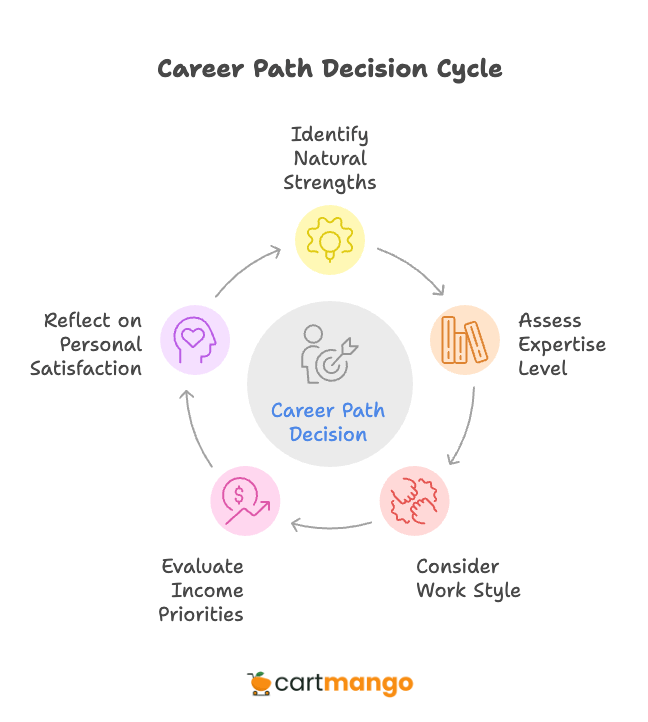
Question 1 gets to your core motivation
Do you light up when helping someone have a breakthrough, or when you crack a complex business problem?
Question 2 reveals your competitive advantage
Coaches succeed with emotional intelligence and broad life experience. Consultants need specialized knowledge that clients can’t find elsewhere – i.e. competitive advantage.
Question 3 exposes your preferred work rhythm
Coaching involves ongoing relationships with regular touchpoints. Consulting means intense project sprints followed by new challenges.
Question 4 addresses timeline expectations
Coaching requires patience to build your practice. Consulting can generate higher income faster if you have the right expertise.
Question 5 reveals what energizes you
Some people thrive on facilitating others’ growth. Others prefer the satisfaction of delivering concrete solutions to challenging problems.
The Hybrid Approach
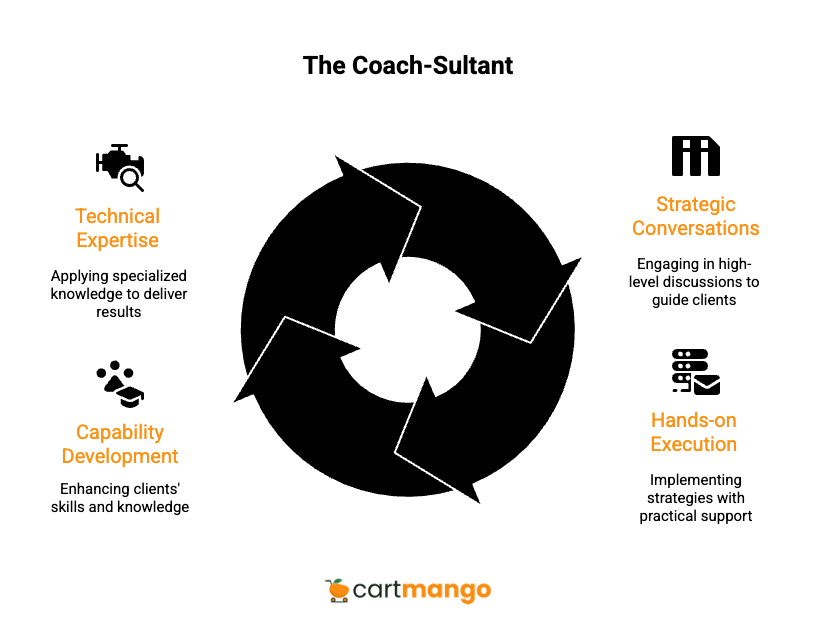
Something interesting is happening in the professional services market. Many practitioners now offer both coaching and consulting in integrated packages.
These “coach-sultants” combine relationship-based development work with tactical implementation support. You might spend half your time on strategic conversations and half on hands-on execution.
I recently met a marketing coach-sultant who helps clients develop their strategic thinking while also building their email sequences and landing pages. She charges premium rates because she provides both capability development and immediate implementation.
This hybrid approach commands higher fees than pure coaching but requires broader skills than specialized consulting. You need both the emotional intelligence to guide people and the technical expertise to deliver results.
The trade-off? You might not develop the deep specialization that commands top consulting rates, or the pure coaching mastery that creates transformational client relationships.
Common Mistakes of Consultants & Coaches
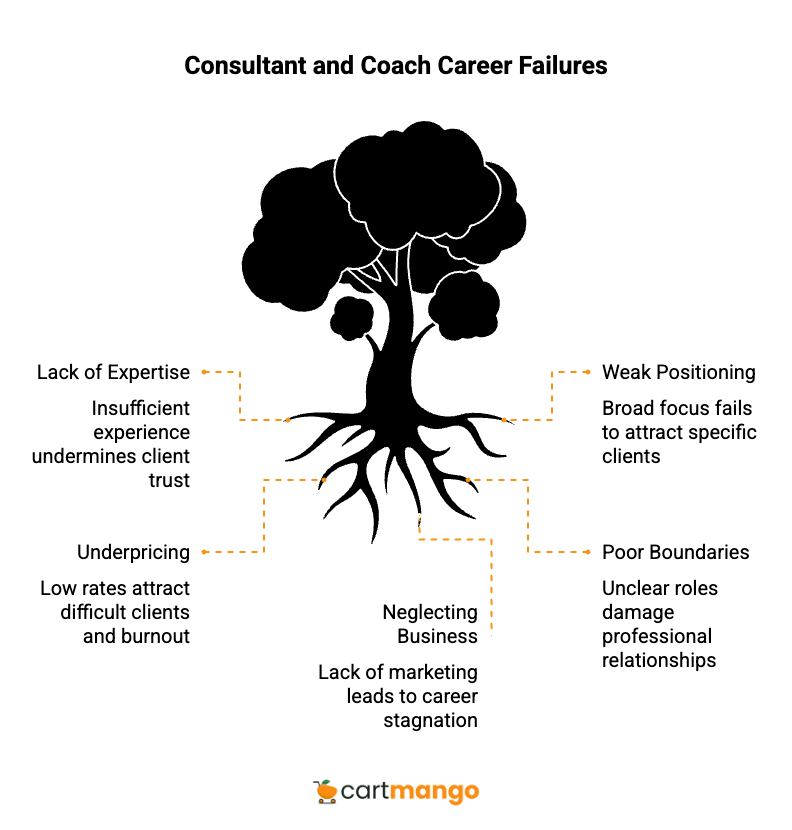
I’ve watched talented people fail in both coaching and consulting. Here are the mistakes that destroy careers before they start.
The biggest killer? Starting without enough expertise or credibility
Coaching requires demonstrated life and leadership experience. Consulting demands proven expertise in specific domains.
Weak positioning destroys both coaches and consultants
“I help anyone with anything” doesn’t work. Make sure you use clear specialization. “I help men professionals build muscles” is bettter.
Underpricing your services signals low confidence and attracts problem clients
Many new practitioners often charge too little and burn out quickly.
Poor boundaries with clients
Coaches who become therapists and consultants who become permanent employees both struggle to maintain professional relationships.
Neglecting business development dooms both paths
You’re not just a coach or consultant. You’re running a business that requires marketing, sales, and operations skills.
Setting Yourself Up for Success
You’ve chosen your path. Now what determines whether you thrive or struggle?
Build your expertise systematically. Coaches benefit from leadership experience, psychology training, and communication skills. Consultants need deep domain knowledge, analytical abilities, and project management skills.
Create systems for client management. You can use a simple spreadsheet or Trello to track prospects and client relationships.
Invest in your business infrastructure. Professional websites (when you’ve got some momentum), clear service descriptions, and testimonial collection systems separate successful practitioners from struggling ones.
Document your processes and methodologies. This helps you deliver consistent results and builds intellectual property you can scale later.
The Operational Reality: How Your Daily Work Actually Differs
Let me repeat again.
The key differences between coaching and consulting become crystal clear when you examine how coaches work versus how consultants work on a typical Tuesday morning.
Business coaching centers on helping leadership teams develop their own problem-solving capabilities. Professional coaches spend years building coaching skills that focus on facilitating discovery rather than providing answers. Coaches focus on asking powerful questions during coaching sessions, while consultants focus on delivering expertise through consulting sessions.
The coaching process means you coaches guide people through personal challenges and behavioral changes so they can grow personally and professionally. Contact person coaching becomes about building long-term relationships where the coach acts as a thinking partner, helping clients explore possibilities and develop leadership skills through goal setting and self awareness development.
Companies hire coaches when they want to develop internal capabilities. Your coaching services help clients discover their own answers rather than imposing external solutions.
Business consultants operate completely differently. Successful consultants leverage subject matter expertise to client solve specific problems quickly. The consulting process involves analyzing the client’s business situation, applying consultant’s expertise, and using a data driven approach to recommend solutions.
Consulting services are strategy based, where you provide solutions and expert advice to improve the client’s competitive position. The consulting focuses on operation coaching through direct implementation using proven methodologies to achieve the same result successful projects have delivered before.
Again, here’s the main difference: coaches focus on building capacity within people, while consultants work on implementing solutions that help clients find success faster. Both paths help reach the client’s goal, but through completely different approaches.
FAQs
Can I start either career as a side hustle while keeping my day job?
Coaching works better as a side business since you can schedule sessions evenings and weekends. Consulting projects often require tight deadlines, making it harder to balance with employment.
How long before I can quit my day job?
Most coaches need at least 24 months to replace their salary. Consultants with strong expertise might transition faster, but both require careful financial planning.
How do you get your first clients?
Coaching often starts with your network and referrals. Consulting might begin with contract work in your expertise area. Both require consistent marketing and relationship building.
What if the market becomes saturated?
Both fields continue growing, but specialization becomes more important. Generic coaches and generalist consultants struggle most in competitive markets.
What qualifications do I actually need to get started in each field?
Coaching doesn’t require specific degrees or cerifications, but ICF-accredited certification helps. Consulting demands proven expertise through experience in your niche (best) or industry certifications.
Which path offers better work-life balance long-term?
Coaching provides more schedule control once established. You set session times and many coaches work 20-30 hours weekly. Consulting can be more demanding with project deadlines, but experienced consultants command higher rates.
How do I know if I have the right personality for each path?
Test coaching by helping friends work through challenges without giving advice. If you naturally ask questions and feel energized by others’ breakthroughs, coaching fits. For consulting, assess if you enjoy being the expert people turn to for solutions.
What happens if I fail in my chosen path – can I recover?
Both fields allow professional pivots. Failed coaches can transition to consulting by developing expertise. Consultants can move to coaching by shifting from giving answers to asking questions. Maintaining your reputation is key.
Coaching vs Consulting – Your Turn
Coaching builds others’ capabilities. Consulting solves their problems.
Use the 5-question framework above to clarify which path aligns with your strengths, preferences, and goals. Your natural inclinations matter more than market trends or income potential.
Both paths can lead to fulfilling, profitable careers when matched to the right person. The key is honest self-assessment and realistic expectations about the journey ahead.
Related
- Sellfy vs Easy Digital Downloads: the revenue hostage (2026)
- SendOwl vs Easy Digital Downloads: the revenue prison (2026)
- SamCart vs Easy Digital Downloads: the revenue trap (2026)
- Easy Digital Downloads vs Payhip: the revenue ransom (2026 )
- Easy Digital Downloads vs Gumroad: the income handcuffs (2026)
- Easy Digital Downloads vs SureCart: the revenue hostage (2026)
- SureCart alternative: the revenue trap no one mentions (2026)
- 8 Ejunkie alternatives: the cart stuck in 2009 (2026)
- Easy Digital Downloads vs ThriveCart: the piracy problem (2026)
- Sellfy alternative: escape the revenue lockout (2026)
